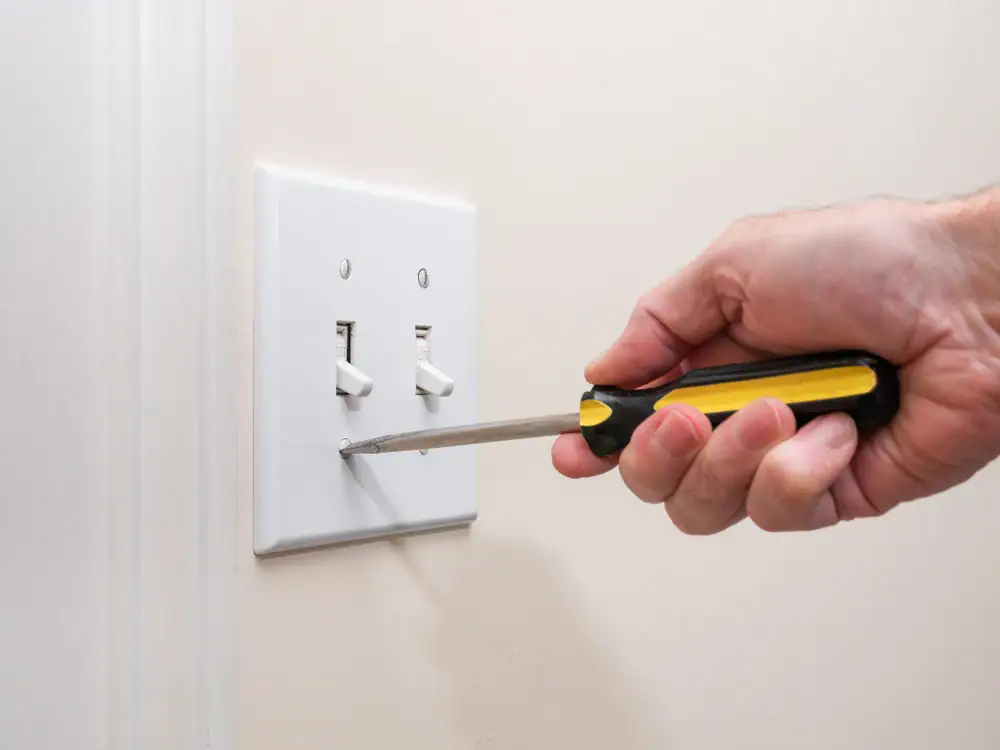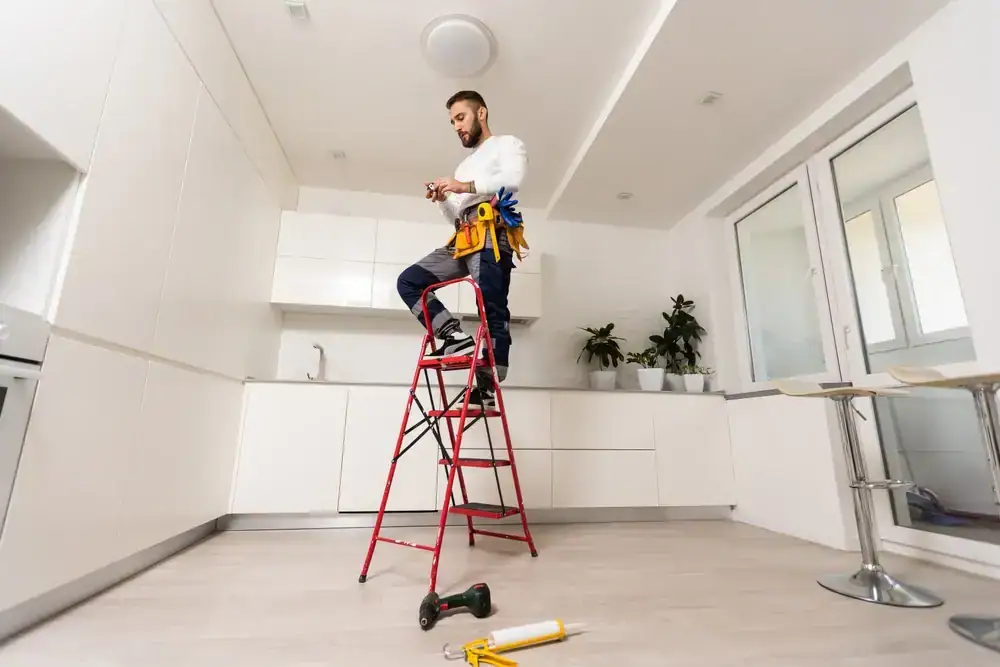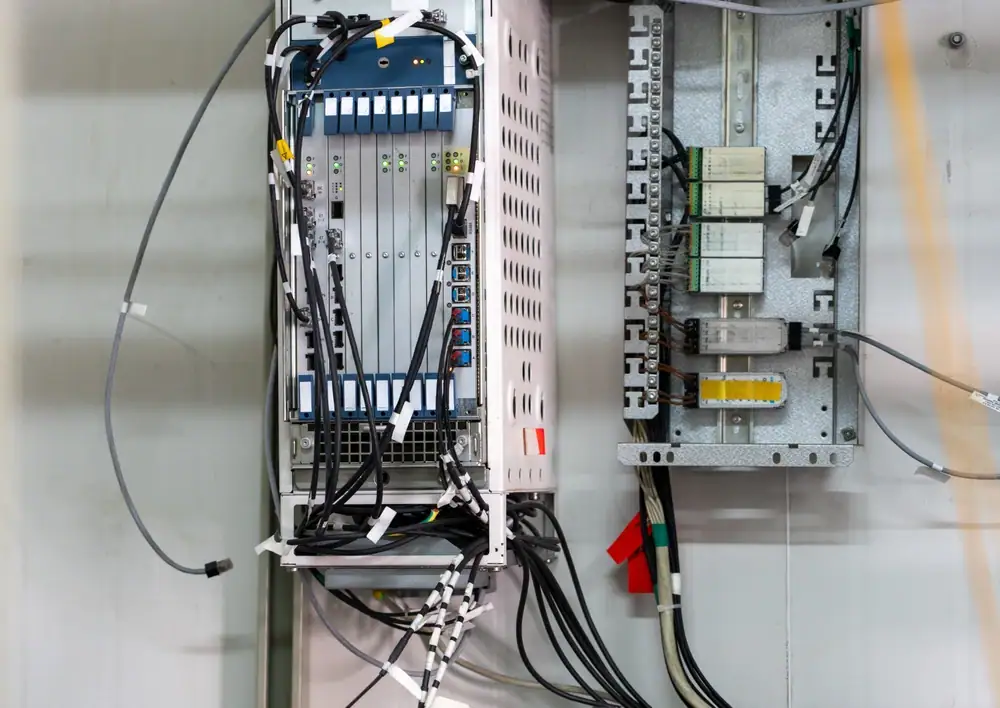Chicago homeowners face unique electrical challenges. Discover the most common problems and when professional electrical repair is essential for safety.
Share:

Summary:
Flickering lights are one of the most common electrical problems Chicago homeowners experience, but they’re not all created equal. While an occasional flicker might not seem serious, persistent flickering often signals underlying electrical issues that need professional attention.
The problem becomes more concerning when you consider Chicago’s housing stock. Many homes built before 1950 still have outdated electrical systems that weren’t designed for today’s power demands. These older systems are working overtime just to keep up.
Understanding what causes your lights to flicker helps you determine whether you’re dealing with a simple fix or a potentially dangerous situation that requires immediate electrical repair.

Several factors can cause your lights to flicker, and each tells a different story about your electrical system’s health. The simplest cause? Loose bulbs. When a bulb isn’t screwed in tightly, it can’t make proper contact with the socket, causing that annoying flicker.
But here’s where things get more serious. Overloaded circuits are a bigger concern, especially in Chicago’s older neighborhoods. When too many appliances draw power from the same circuit simultaneously, it creates temporary power dips that make lights flicker. Your electrical system is basically saying “I can’t handle this load.”
You might notice lights dimming when big appliances kick on—the air conditioner, washing machine, or electric dryer. This voltage drop happens when your electrical panel doesn’t have sufficient capacity for your home’s current demands. It’s like trying to drink a milkshake through a coffee stirrer.
The most concerning cause is faulty wiring or loose connections. These create fire hazards and require immediate professional attention. Faulty wiring contributes to thousands of house fires annually, making this a safety issue you absolutely cannot ignore.
Sometimes the problem isn’t even in your house. Utility issues can cause widespread flickering throughout your neighborhood. If your neighbors are dealing with the same problem, the issue likely lies with ComEd’s equipment rather than your home’s electrical system.
Not all flickering lights indicate emergencies, but certain patterns should send you straight to the phone to call an electrician. If lights flicker throughout your house without any apparent trigger, this often points to problems with your main electrical connection or panel—serious stuff.
Here’s what should make you stop everything and call for electrical repair: flickering accompanied by burning smells, buzzing sounds, or switch plates that feel warm to the touch. These symptoms suggest arcing—when electricity jumps across gaps in damaged wiring. Arcing generates extreme heat and poses serious fire risks.
Chicago’s older neighborhoods like Lincoln Park and Old Town present unique challenges. Historic homes often have electrical systems that haven’t been updated in decades. Knob and tube wiring, common in pre-1950 homes, becomes dangerous over time as insulation deteriorates. These systems were never meant to handle modern electrical loads.
If your lights flicker only in one room or area, the problem might be isolated to that circuit. But don’t assume it’s harmless—this still requires professional diagnosis to determine whether loose connections or damaged wiring are creating hazards behind your walls.
We have specialized tools to identify dangerous conditions that aren’t visible to homeowners. We can distinguish between minor issues and serious safety concerns, ensuring your family’s protection while solving the underlying problem.
The bottom line: when flickering moves beyond occasional annoyance to become a regular occurrence, it’s time for professional electrical repair. Your family’s safety is worth more than the cost of a service call.
Want live answers?
Connect with a Jimco Electric expert for fast, friendly support.
Circuit breakers that frequently trip are trying to protect your home from electrical overload or dangerous conditions. While an occasional trip isn’t cause for alarm, repeated tripping indicates underlying issues that need addressing through professional electrical repair.
Think of circuit breakers as the security guards of your electrical system. They’re designed to shut off power when they detect problems like overloads, short circuits, or ground faults. When a breaker trips, it’s actually doing its job—preventing potentially dangerous situations.
Understanding why breakers trip helps you determine whether you can resolve the issue yourself or need professional electrical repair services to keep your Chicago home safe.

Circuit overload tops the list of reasons breakers trip, and it’s especially common in Chicago homes where electrical systems haven’t kept pace with modern living. This happens when you plug too many devices into outlets on the same circuit, drawing more power than the wiring can safely handle.
Kitchen circuits are notorious troublemakers because they serve high-power appliances like microwaves, toasters, coffee makers, and that new air fryer you got for Christmas. Add a space heater during Chicago’s brutal winters, and you’re asking for trouble.
Short circuits create more serious problems and require immediate electrical repair. When hot and neutral wires touch due to damaged insulation or loose connections, they create dangerous power surges that immediately trip breakers. Short circuits generate enough heat to start fires, making them genuine electrical emergencies that often require professional emergency electrical services.
Ground faults occur when hot wires contact ground wires or grounded surfaces—think water and electricity meeting where they shouldn’t. This creates an unintended electrical path that can be dangerous, especially in wet locations like bathrooms and kitchens. Ground Fault Circuit Interrupter (GFCI) outlets provide additional protection, but they need to work properly.
Faulty appliances can also cause repeated tripping. When appliance wiring fails internally, it creates shorts or ground faults that trip breakers every time you use the device. That old refrigerator or washing machine might be the culprit behind your electrical problems.
Arc faults represent another serious concern requiring professional electrical repair. These occur when electrical connections become loose or corroded, causing electricity to arc across gaps. Modern homes have Arc Fault Circuit Interrupters (AFCIs) that detect these dangerous conditions, but older Chicago homes might lack this protection.
Resetting a tripped breaker seems straightforward, but safety comes first—always. Before touching any electrical equipment, ensure your hands are completely dry and you’re standing on a dry surface. Water and electricity don’t play nice together.
Head to your electrical panel and identify the tripped breaker. It’ll be in a position between “on” and “off” or might show a red indicator, depending on your panel type. Turn the breaker completely to the “off” position first, then firmly switch it back to “on.”
If the breaker trips immediately or won’t stay in the “on” position, stop right there and call for professional electrical repair. This indicates a serious problem that requires expert diagnosis—not a DIY weekend project.
After successfully resetting a breaker, take it slow when restoring power. Plug in or turn on items one at a time, waiting a few minutes between each to ensure the circuit remains stable. This process helps identify whether a specific appliance caused the original trip.
But here’s when you need to stop and call us immediately: if you smell burning, see scorch marks around outlets or the electrical panel, or hear crackling sounds. These symptoms indicate dangerous conditions that could cause fires or electrocution.
Repeated tripping of the same breaker, even after reducing the electrical load, suggests underlying wiring problems. Chicago’s older homes are particularly susceptible due to aging electrical systems that may not meet current safety standards.
We have specialized equipment to diagnose electrical problems safely. We can determine whether issues stem from overloaded circuits, faulty wiring, or failing breakers themselves. More importantly, we can assess whether your electrical system needs upgrades to handle your home’s power demands safely—crucial for older Chicago homes.
Electrical problems like flickering lights and tripped breakers shouldn’t be ignored, especially in Chicago’s older homes where electrical systems face unique challenges. While some issues have simple solutions, others indicate serious safety hazards that require immediate professional electrical repair.
The key is recognizing when to call for help. Persistent problems, burning smells, or multiple electrical issues occurring together are clear signals that professional diagnosis is essential. Licensed electricians have the expertise to identify dangerous conditions and provide safe, lasting solutions that protect your family.
When electrical problems arise in your Chicago home, don’t wait for them to worsen. Contact us for reliable electrical repair services that keep your family safe and your home properly powered.
Article details:
Share:
Continue learning: